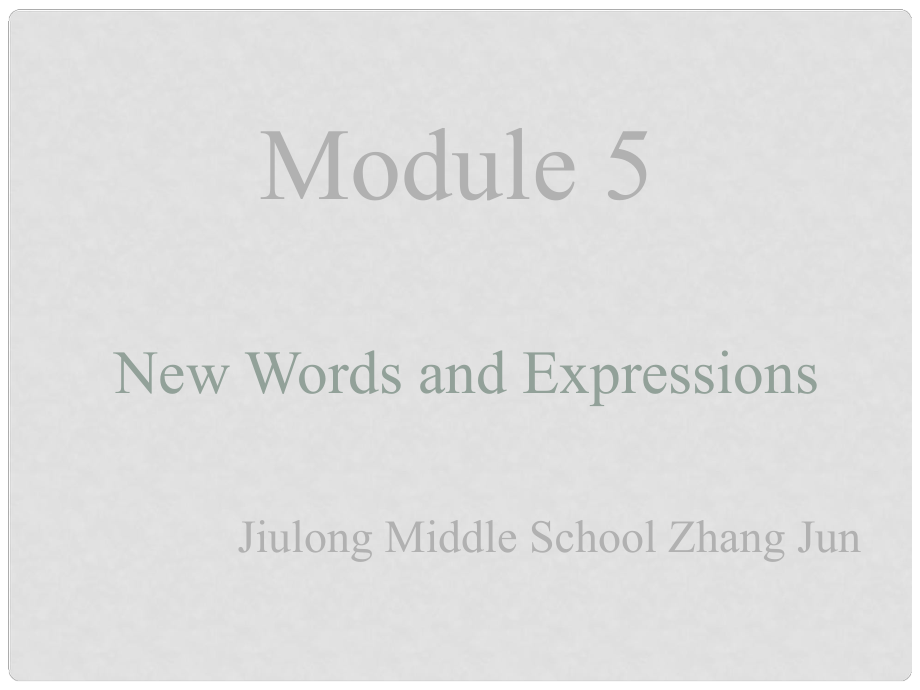《高中英語(yǔ) module 5 New Words and Expressions課件 外研版必修2》由會(huì)員分享�,可在線閱讀,更多相關(guān)《高中英語(yǔ) module 5 New Words and Expressions課件 外研版必修2(13頁(yè)珍藏版)》請(qǐng)?jiān)谘b配圖網(wǎng)上搜索���。
1�����、Module 5 New Words and ExpressionsJiulong Middle School Zhang Jun 1.Equal adj. (1) the same in value, amount, or size; (2) having or deserving the same rights and opportunities as other people v. (1) to be the same in value or amount as something else; (2) often passive to achieve the same standard
2�、or level of ability as someone else n. someone or something that has the same value, rights, or importance as another person or thing, or that deserves the same respect e.g1)The aeroplane can fly straight only if the lift is equal to the weight. 2)And Hyde and Jekyll now hated each other with equal
3�����、passion. 3)If the number of babies born equals the number of deaths, then the population will stay the same. 4)Theyre not willing to recognise women as their equals. 2.order n. (1) the way in which a set of things is arranged or done, so that it is clear which thing is first, second, third, etc.; (2
4����、) a request for a product to be made for you or delivered to you; (3) an instruction given by someone in a position of authoritye.g. 1)Everythings in order. 2)I was looking for an order for a diamond ring. 3)These are orders from the boss! v. (1) to put things in a particular order; (2) to ask for f
5、ood or drink in a restaurant or hotel; (3) to tell someone to do something or say that something should be done, in a way that shows you have authoritye.g.1)He ordered a cheeseburger and French fries. 2)On this morning in June, Anita had been ordered to report to the Building and to wait there. 3.po
6�����、sition n. (1) the way that someones body is placed; (2) a general situation; (3) where something is in relation to other things; (4) an opinion about an important issue; (5) someones rank or status in an organization or in society; (6) the place that someone or something has in a list or competition
7�����、v. (1) to put something in a particular place; (2) business to make people think of a product in a particular waye.g.1)My new position wont change that, and Ill be friendly with you all, just as before. 2)He knew his position was dangerous. 4.Stress n. (1) a worried or nervous feeling that stops you
8、 relaxing, caused, for example, by pressure at work or financial or personal problems; (2) special importance given to something so that you pay more attention to it; (3) physical pressure put on something that can make it change its shape or break; (4) the emphasis you put on a particular word or s
9�����、yllable (=part of a word) by pronouncing it more loudly or with greater force than other words or syllables v. (1) to emphasize something such as an idea, fact, or detail; (2) to pronounce a particular word or syllable (=part of a word) more loudly or with greater force than other words or syllables
10�����、e.g.1)The Prime Minister has repeatedly stressed the importance of controlling inflation. 2)He stressed that this would be a temporary appointment. 3)The English teacher ought to stress the importance of studying English conventions. 4)The leader stressed the law is very important. 5.love n. (1) a v
11�����、ery strong emotional feeling for someone; (2) the feeling of liking and caring for someone such as a member of your family or a close friend; (3) someone you have a romantic relationship withv. (1) to be very strongly attracted to someone in an emotional way; (2) to care very much about someone, esp
12����、ecially members of your family or close friends; (3) mainly spoken to like or enjoy something very muche.g.1)It was a song about the sea, and about love. 2)I saw his love for flowers. 3)You are in love with Christine. 4)I worked hard for her, and I loved the work. 5)My father loved his visits. 6.Bar
13�����、k n. (1) the hard substance that covers a tree; (2) the short loud sound that a dog makesv. (1) to make the short loud sound that a dog makes; (2)to say or shout something in a loud angry voicee.g.1)We looked at the marks on the piece of bark. 2)He jumped back, waiting for the attack, but heard only
14�、 a friendly bark. 3)The shark was starting to bark. 4)His bark of laughter interrupted her. 7.Soft adj. (1) a soft substance is easy to press or shape and is not hard or firm; (2) usually before noun a soft sound is quiet and pleasant to listen to; (3) kind and sympathetic to other people; (4) infor
15、mal not complicated or not needing a lot of effort; (5) soft water does not contain many natural minerals and is easy to use with soape.g.1)Did our Lord Jesus have soft woollen blankets, Ellen? she said. 2)I did her hairever so soft and pretty it wasand I put the most lovely flowers all round her he
16�、ad. 3)The water was clear and soft as oil. 8.fuel n. a substance such as oil, gas, coal, or wood that produces heat or power when it is burnedv. (1) mainly journalism to make something increase or become worse, especially something unpleasant; (2) to put petrol into your vehiclee.g.1)It uses up trees, fuel and chemicals. 2)The energy stored in the fuel comes from the Sun. 3)When the fuels are burnt, they emit carbon dioxide. 4)I fuel up at a wee petrol station.
 高中英語(yǔ) module 5 New Words and Expressions課件 外研版必修2
高中英語(yǔ) module 5 New Words and Expressions課件 外研版必修2

